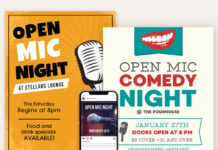More so than even jukeboxes and DJ sets, live music has a unique flavor that can set the tone (pun intended) for your bar or club. Whether hosting local bands or national recording artists, live performances have the potential to draw a profitable crowd on any given night. However, before customers start slapping their hard-earned money on the bar to see a good show, there are steps that owners need to take in order to prepare their rooms from both a technical and marketing standpoint.
For starters, your venue needs to be equipped with a solid sound system that adheres to both your floor plan and audience needs. The system you ultimately decide to invest in will be dependent on a number of different factors, including performance genre, room size, and budget. Once a system has been put in place, scheduling bands or artists that can draw a paying crowd will require smart booking and promoting tactics to ensure solid attendance and money in everyone’s pockets.
If you build it…
“One of the most important things to have is an ample stage area, but another critical component is the live sound system,” says Brian Ison, marketing manager for Showmen Supplies, La Porte, Indiana. “It used to be that bands would own their own PA, but now it’s expected that the club has its own sound system, and in some cases their own sound person.”
Chris Karr, owner of the Pickle Barrel Nightclub, Killington, Vermont, knows that getting set up with your own sound system is never a bad idea. “Sometimes there will be fly dates and bands will simply show up,” he says. “You’re going to need to provide amplifiers, drums, keyboards, etc. It’s very common for that to happen.”
A proper and basic live sound system consists of PA speakers and a power amp, microphones, and a mixing console. The exact package in which you should invest will depend on the size of your room, the type of live performances you will generally host, as well as what portion of your budget you can or want to delegate to this particular aspect of your business. “You can get a really good but basic system for $1,500-$2,500, while a full-blown system can cost tens of thousands of dollars,” says Ison, who has been in the music industry for over 20 years as a musician, sound technician, and retailer. “It depends on the size of the room and how loud you need it to be. If you’re having an open-mic acoustic night, a small PA for under $1,000 will handle it. But if you have a room for over 250 people, you’re going to need larger speakers, more of them, and more power.” Popular brands such as Mackie, Peavey and JBL offer live sound systems that are specifically designed and marketed for use in bars and clubs.
Elle Quintana, talent buyer for Reggie’s Music Joint, Chicago, Illinois, believes that investing in a quality sound system is important, but also makes sure that her acts sound their best by keeping a sound technician on staff. “Any bar or club that is serious about having live music needs their own equipment and a sound person who is also making sure that equipment isn’t getting trashed or stolen,” she says. “A lot of venues or bars make the bands pay for the sound person, but I consider sound a part of my staff and they’re paid out by the bar. If we have a quality sound person and bands that bring in drinkers for $6,000 bar ring, then I don’t mind paying $125 out to my sound person.”
Regardless of the brand or size of the system you install, arrangement of its components is equally important in terms of producing the best possible sound during any given performance. Obviously, the arrangement will ultimately depend on your floor plan and available space. The speakers, for example, can be mounted on tripods, which will consume floor space, rested on shelving, which limits their direction, or hung from the ceiling, which is the method Ison recommends.
“Hanging the PA system is really the way to go,” he advises. “It will be out of the way and the speakers can be aimed and directed. There are some liability issues with hanging, however, so it’s important to have it installed by someone who knows what they’re doing. A lot of sound equipment manufacturers sell products designed to be either hung or mounted.”
The mixing console or board, which allows your sound person to control the overall sound levels of both the microphones and the instruments, should be located 25-50 feet from the performance area. “If they are too close or too far away, they won’t get an accurate reading,” says Ison. “All rooms are different, so it’s also good to have an equalizer to ‘tune the room’ so to speak. Some have carpeting or hardwood flooring or glass panels—these all affect sound.”
When it comes to the system’s accessories, such as microphones, it’s a judgment call on the part of the bar or club owner as to how many will be made available, if any. Some venues may choose to provide an array of microphones for vocals and instruments, while others may take a B.Y.O.M (bring your own mic) approach. According to Ison, microphones can be easily damaged or stolen, and it may not be worth it on the part of the owner to purchase and constantly have to replace them.

…they will come…
There is no point in investing in and installing a sound system of any quality or size if you are not booking any bands or artists to use it. Once you have an idea of what kind of acts you will be hosting and for how big a room, your next step is to hire the bands and artists for which you have set-up your system.
You want to book performances that you know will have a draw and will bring in a crowd that is more than happy to spend money on a cover charge and drinks. The terms set between a venue and its scheduled act, as far as payment is concerned, will vary from place to place. Some venues may choose to pay out their bookings based on a percentage of the admissions charges, allotting them a payment based on how many customers walk through the door. Others will pay a flat rate to the act, which may not be profitable if that rate is more than the venue brings in that night.
“You don’t always know that you’re going to make money hosting live music,” says Karr. “The beauty of the bar business is that whether or not you do a good job of entertaining people, you still have the ability to sell alcohol. You can fall back on this income should you need to recover the costs or even short falls in paying for entertainment.”
One way to relieve any potential financial disagreements or otherwise with a booking is to establish the contract and non-legal expectations of both parties in advance. Whether it is scheduling the date, set length, or payment method, agreeing on the terms prior to the performance is essential in avoiding headaches. It also contributes to building a positive reputation for your bar or club as a good place where bands or artists can perform a hassle-free show. “It’s important to detail out everything that’s going to happen that night,” advises Karr. “Know what’s going on in terms of when they are going to arrive and what their needs are going to be. I’ve seen horror stories where bands show up expecting there to be a PA and there isn’t one.”
Booking bands or artists to play in your bar or club can be accomplished through a number of ways. Often bands will contact your venue directly and set up a date and time with whomever is responsible for booking the talent, but it is probably a good idea to keep up with what is going on with your local music scene, especially since it can draw in a solid crowd of nearby fans. Keeping track of acts that have brought in a good-paying crowd is always helpful for re-booking. “You get it from all sides,” says Karr. “But I think the most important thing to do is to go out there and understand your market.”
Scheduling a multi-act line-up for a night should be done within a similar, if not the same music genre. That way, the crowd that comes to see one type of act will want to stay for the others. “I’ll set up a date with the first band and then I’ll build the night around them,” says Quintana. “It’s important to have a cohesive line up. Ultimately you want patrons to stay for all the sets and drink throughout the night. If you mix a rock act with a folk act and a metal act with a hip-hop act, no one is going to be happy and people won’t stay.”
When it comes to hosting, the golden rule should be the standard philosophy. While bands or artists should be respectful of the venue, it is their show that is responsible for bringing money to the bar or club. You don’t have to break your back, but both Quintana and Karr agree that good hospitality factors in to whether acts want to return to your venue and recommend it to others. “Treat them right,” says Quintana. “They’re going to tell their friends and their fans what a great experience they had and the word is going to get passed on.”
Says Karr, “A big mistake is to not provide for or pay attention to the needs of the act. You’re better off rolling out the red carpet because it sets the tone for a lot of it.”
…and so will paying customers.
So, you have the system set up and acts booked. Now you need to get paying customers into your bar or club. Most owners will agree that bands and artists are the best promotion tools out there. With the explosion of social networking applications like MySpace and Facebook, event announcements to a built-in fan base spread quickly. The bands and artists may also utilize print promotions like fliers or event cards to hand out on the streets or post on bulletin boards. Then again, there is always good old fashioned word of mouth to relay calendar dates and venue locations.
All of these options can, of course, be employed by the venue as well. Karr, whose Pickle Barrel Nightclub has a long history of booking acts from local bands to national recording artists such as Wu Tang Clan and everyone in between, stresses the importance of knowing your reach and staying within a budget. “Whether your promotions be electronic, printed, or radio, you have to figure out the best way to reach either the club’s fan base of the band’s fan base,” he says. “Analyze the act itself, then figure out in terms of your budget how to approach the process.”
He goes on to advise that owners need to keep in mind the fact that when hosting live music, you are promoting both the band and the venue. “Promoting is hard work,” he says. “Sometimes, on an off-night, you can promote a band that will wind up filling the place. But on a normally busy night, let’s say a Saturday, in a sense you don’t need to promote the act, just your room.”
Either way, live music an be a great way to bring something to your venue that will draw new clientele and keep the regulars around longer, and the result is a song in the key of $. “I’ve seen everything from jukeboxes to karaoke to Guitar Hero,” says Ison, “but there is nothing like a live band.”








